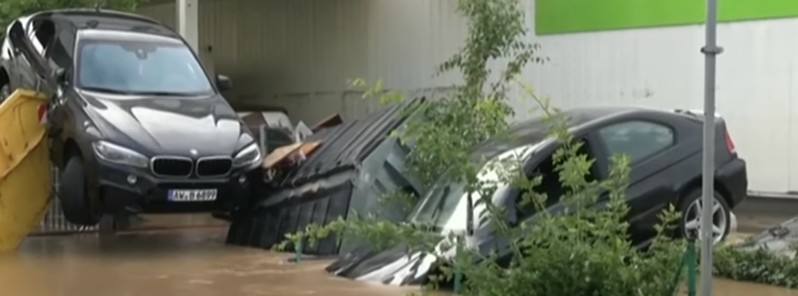Extreme rainfall causes catastrophic flooding in western Germany

At least 18 people have died and many more are still missing after exceptionally heavy rain caused massive flooding in western Germany on July 14 and 15, 2021. Numerous rivers across the region are still above flood stage or at exceptionally high levels and several dams are at the brink of collapse. The government has called in helicopters to help rescue people stranded on the top of buildings. Extreme rainfall and floods have also affected neighboring countries, including Luxembourg, Switzerland, Belgium, the Netherlands, and France.
- Exceptionally heavy rains hit western Germany on Wednesday, July 14, causing massive damage, leaving hundreds of thousands of homes without power and prompting mass evacuations.
- Internet and telephone communications are down, as well as power, gas, and drinking water for millions of residents.
- Parts of the region registered more than two months' worth of rain in just 24 or 48 hours.
- Heavy rains are expected to continue on Thursday, with continuous downpour until Friday evening.
According to official reports received Thursday morning, July 15, at least 8 people are known to have died in the Euskirchen district of the German state of North Rhine-Westphalia.
The situation in the state is very critical and rescue efforts are still underway, district authorities said early Thursday morning. Communication, including internet and telephone connections, is down and the 112 emergency number is not reachable.
Authorities of the state of Rhineland-Palatinate said 4 people have died in Ahrweiler county, adding that many more are reported missing.
"Many of the missing people were on the roofs of houses that were washed away in the town of Schuld," Koblenz police spokesman said. The spokesman said they estimate about 50 people were awaiting rescue on roofs.
As of late July 14, the Ahr river at Altenahr reached 5.75 m (18.8 feet), well above the previous record high of 3.71 m (12.2 feet) set in 2016.
The city of Hagen declared a state of emergency and called for people to evacuate their homes after the Volme river burst its banks. "If you can’t leave the house, you should move to higher floors so that you can be rescued from there if necessary," authorities said.
The same was reported in the city of Düsseldorf after the Düssel river reached a record high of 2.65 m (8.7 feet) on July 14.
5 people have already lost their lives in different parts of western Germany on Wednesday, July 14. Among them is a fireman who drowned during rescue work in Altena and an 82-year-old man who drowned in his basement. Another fireman died in the line of duty in the town of Wedohl on Thursday.
"We haven't seen a disaster like this. It's just devastating," Rhineland-Palatinate’s state premier Malu Dreyer said, as reported by DW. "There are dead, there are missing, there are many who are still in danger," she said.
As of July 15, rivers in at least 15 locations are at the highest warning level.
The governor of the Belgian province of Liege, Catherine Delcourt, said Thursday morning that at least 2 people have lost their lives in the province and that several others are missing
At least 2 000 people have been forced to evacuate, including hundreds of scouts who were camping in Wallonia.
Some towns in the country saw water levels rise to unprecedented levels and had their centers turned into gushing rivers, the AP reports.
Unusually heavy rains have also affected parts of France this week, causing floods, downing trees, and forcing the closure of dozens of roads.
Meteo France said some areas of the country saw the equivalent of two months of rain in the last day or two. With the ground already saturated and more rains in the forecast, flood warnings have been issued for 10 regions.
Authorities in the Netherland ordered the evacuation of parts of the town of Valkenburg and sent some 70 troops to the province of Limburg to help with flood defenses and evacuation.
Floods, landslides, and mudslides have also been reported in Switzerland.
Authorities in Geneva are urging people not to walk along rivers and stay away from River Rhone and Lake Geneva, EuroNews reports.
The risk of flooding is still high on the shores of Lake Zurich, Limmat River, the lakes of Thun, Biel, the Upper Rhine, and the Reuss River. A very high risk of flooding is reported at Lake Lucerne in central Switzerland.
Swiss Federal Railways said several mountain passes and tunnels have been closed, adding that rail traffic is still disrupted in several parts of the country.
Featured image credit: DW (stillshot)

The same as every year!